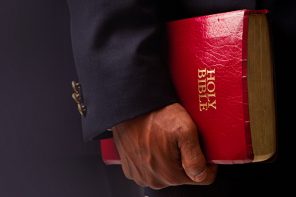Of all the religion-and-politics takes on Doug Jones’ victory over Roy Moore—and there are many—one of the most obscure sticks out the most. It comes in the midst of a discussion by independent journalist Al Giordano of get out the vote efforts in southern Alabama:
The Mobile NAACP crunched the numbers and showed local pastoral leadership that whatever they had done in recent years to turn out voters wasn’t working. The pastors then pushed for and got resources to do congregation-wide robo calls and voter reg tables at church events.
There are legitimate concerns about churches getting involved this closely with a political campaign, whether Republican or Democratic. From a process perspective, though, this is certainly interesting. A secular organization (albeit one that surely has deep connections to local churches) provides data to religious leaders, who then ask for—and receive—the resources they need to turn out the vote. It’s a model that’s often been used by the Religious Right, but it’s the first time I can recall it being deployed on the left, at least in coordination with a specific campaign. This is how concerned but disorganized voters get turned into a potent grassroots movement: coalitions working together to translate political positions into electoral results.
What happened in Alabama Tuesday night wasn’t the result of superior morals, nor was it a victory for the #prophetic #resistance of the modern religious left. It was the exercise of pure, raw power. Obviously, chasing and sexually assaulting teenagers is an easy thing to run against. But as we saw, many voters discounted or simply ignored that issue. And though Moore was a truly lousy candidate, even disappearing from the campaign trail for two of the closing weeks, he very nearly coasted to victory on nothing more than party-line votes. What ultimately won Jones the election was a strong and well-coordinated ground game. That’s what using power looks like.
Some liberals are allergic to the idea of power, particularly Christian liberals, whose default position seems to be that the political system is a sinful human structure in desperate need of transcendent redemption, rather than an imperfect-but-necessary tool for productive life between now and the Second Coming. But power doesn’t have to be synonymous with McConnellian levels of cynicism, ruthlessness, and domination. It can be exactly what we saw in Alabama, which is to say, using the leverage available to effect change. Widely-distributed power, even if thin, can work wonders.
It’s important to note that the power on display Tuesday night was deeply rooted in personal contact. That’s how the ground game works. Democrats truly committed to taking back the nation should be prepared to do some door-knocking next year. A lot of door-knocking (calling, texting). That kind of personal connection does two things: it lets average voters feel heard. It also solves a lot of messaging debates. Do white working-class voters need to hear a strong economic message? Get their neighbors to give it to them. Do black women need to hear a message of hope and liberation? Deliver it to them through the religious institutions they trust. A coalition of citizens speaking to itself is stronger and more inspiring than any candidate.
Along those lines, if Democrats are wise, they’ll put combatting voter suppression at the top of their list of priorities. Using power includes using it on behalf of those who lack it, giving back to them what belongs to them.
We have seen wave after wave of wave elections since 2006. Many voters don’t feel heard in the current political atmosphere, adding fuel to hyper-partisanship. The first group to build on a wave—and sustain it—has the potential to build a stable and enduring coalition. America seems to be at a crossroads, and looking for someone to lead them in some direction. 2018 and 2020 could be highly rewarding years for Democrats, if they’re willing to the do the hard work of exercising power through organizing the emerging coalition of women, minorities, and young voters.
Again, this is simply to say using all the tools available to them. Democrats will also have to do a few things more in the mold of how we traditionally understand power, that is, naked partisanship: restoring the Voting Rights Act, ending felony disenfranchisement, perhaps even blowing up the Electoral College. This agenda is less comfortable for those who want to stay on the moral high ground. It’s also probably absolutely necessary to save American democracy.
The religious left could play a significant role in the years to come, if it’s willing to give up its over-reliance on performative displays of faith, messaging, and moralizing protests. I’ve suggested before that it could do worse than to emulate the Indivisible movement, and that still seems like good advice. If the recent special elections in Georgia, Virginia, and Alabama demonstrate anything, it’s that turning out the vote is the way to win elections these days. Getting citizens to literally drive other citizens to the polls is far more effective than any “moral revival” or religious celebrity could ever be. Raw power is real power. If the religious left ever wants to be more than a bit player with prophetic sprinkles on top, it’s going to have to get comfortable with that idea.
(Click here if you don’t get the featured image.)





